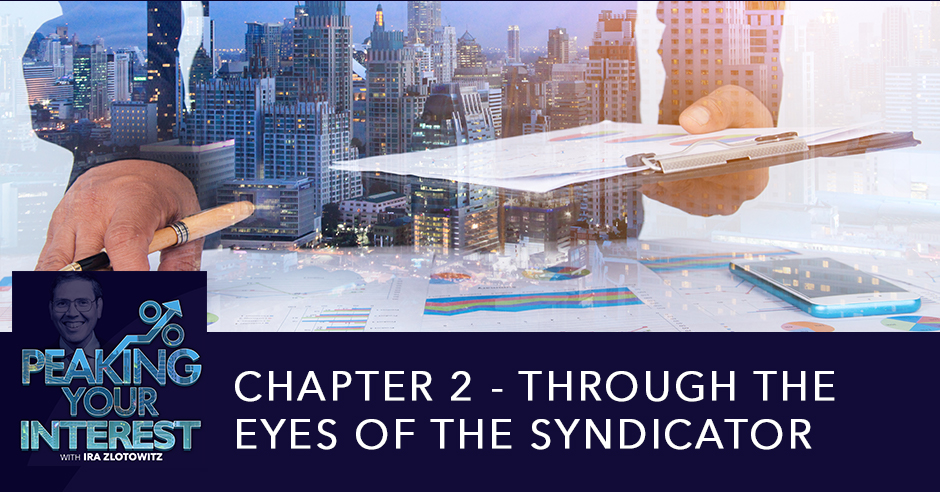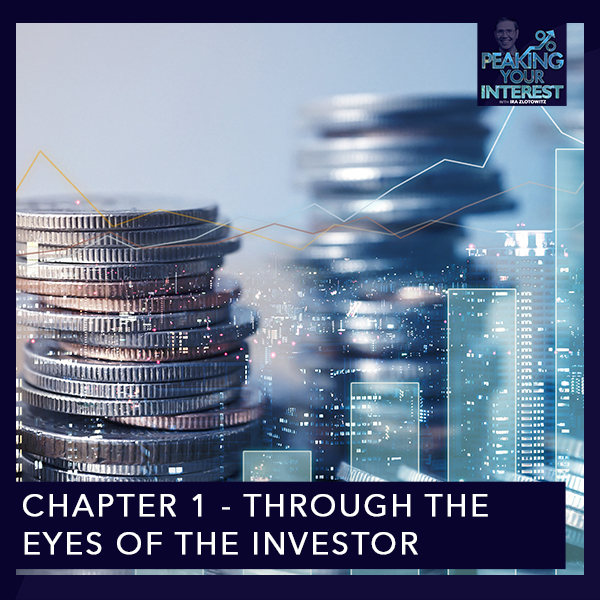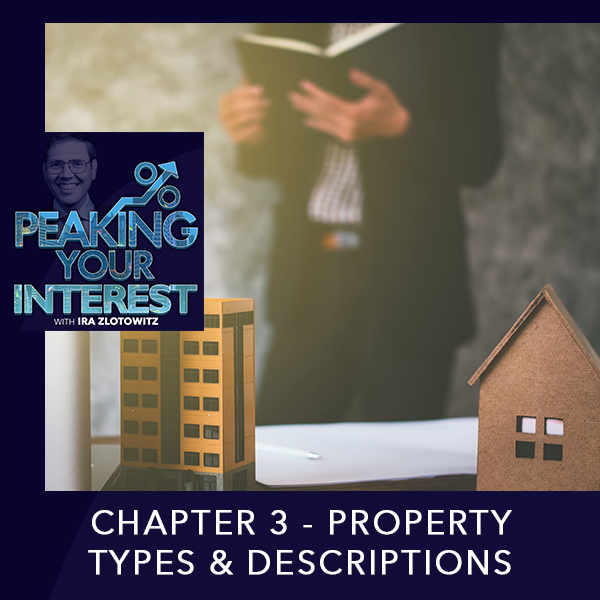Chapter 2 – Through The Eyes Of The Syndicator
- On March 2, 2020

Rounding out your understanding of different perspectives in investing is absolutely essential to being able to gracefully navigate the industry of investing as a whole. One of these must-understand perspectives is that of the syndicator: investors who purchase properties using other people’s money. Ira Zlotowitz navigates the viewpoint of syndicators when it comes to using the money they’ve raised to make investments. Because syndicators have become such a huge part of the investment industry ecosystem, it’s important to understand their perspective – why they do the things they do. Learn more about syndicators here!
—
Listen to the podcast here:
Chapter 2 – Through The Eyes Of The Syndicator
We’re going to start with Chapter Two, which is also a perspective number two, through the eyes of the syndicator. Now you have an idea, it’s the person with the money. What about the syndicator, the person that’s buying the deal? Let’s start a little bit here to break it down. There’s been a lot of confusion with different terminologies as far as a buyer and owner, a syndicator. What is a syndicator? How does he/she differ from a real estate buyer? The answer is they’re both the same. Someone that’s buying real estate is a buyer. The nuanced difference is where’s the money coming from? A buyer buys real estate typically with their own money. They go to the contract. They bought a deal with their own money. A syndicator is somebody who comes, it’s called OPM, Other People’s Money primarily. They’re the person that will go to contract without the money. Let’s say they’re buying a $10 million deal and they have to come up with $2.5 million to $3 million in total.
They may only go to contract with their own money, but they’re going to go around and raise the money from friends, family, partners and investors to put the money together. They call it syndicating. They’re going to syndicate the entire transaction. What I’m going to focus throughout this course and keep using the word syndicator because that’s 90%, but the overwhelming majority of people that are buying real estate are not putting up the money to themselves. They’re either putting up a small part of the money, number one, or they’re putting up a small percent of the money and they’re raising it from outside as limited partners. Even if they’re not true syndicators like partners, but it’s even partners to themselves. The person you’re dealing with is someone that controls the situation, but they’re not the person that puts up all the money. They syndicate the whole transaction. What are the main risks of being a syndicator? The first risk is opportunity cost. Opportunity cost means the time value of money.
If I’m working and I get paid $100 an hour, every hour of work, I make money. If in order to make that $100 an hour, I have to drive somewhere and have to drive back home. The drive is twenty minutes and twenty minutes home. I didn’t earn $100 an hour. I earned $100 for an hour and 40 minutes. How much time am I wasting? What’s a time value that I’m going to have to spend before I could stop making money? That’s the opportunity cost. When someone is looking to buy a building, what could they do with that extra time, extra money? If I’m looking to buy real estate, I’m a syndicator, I’m walking out into the street every day to listen to deals for sale, going onto the internet, searching things, doing research, driving down to the building, spending time. I could have done something else at that time. I have a loss of time. I only make money if I’m successful. I buy a deal and I put it together. I get my fees, etc., but there’s an opportunity cost to go ahead and get that far.
The second thing is the economic cost. Throughout the process, I may be running into an issue. The issue I may be running into is I have to spend along the way. The first part was spending time looking through the deal. I’d go to look at a property and I look at a property in a different state. I have to fly down there or I have to go wine and dine different brokers in order to meet them and get transactions going. We go further in the process. I’m going to buy this transaction. I go into contract and have to hire an attorney. I have to start laying out money. There’s money that could be at risk.
Syndicators are real estate investors who buy properties with other people's money. Click To TweetThe last one is the most important. The most important one is going backward. If you signed a personal guarantee, the wording in commercial real estate is called recourse. You sign a recourse. That means there’s a recourse to you. If there’s a problem, the lender could come back to you. If you’re going to sign a recourse on a deal and God forbid the deal goes sour, not only did you lose the money you put in, not only did you lose the time you put in, but you could also have to owe extra money that you didn’t count on. What’s an example so you can understand it?
Someone buys a building for $10 million, when they’re raising money for the deal, let’s say $3 million they need in total, all the closing costs and everything to take out a mortgage for $7.5 million or $8 million irrelevant. Let’s keep the numbers around the total cost is $10 million. They put up $3 million of equity. They take a loan for $7 million. We’re getting loans at 80% but sometimes higher. In that case, if that was a nonrecourse loan and God forbid there’s a problem. One day the bank walks over to the syndicator and says, “We’re having a problem. You can’t afford the bill.” The syndicator could say, “I’m sorry, you’re right. I tried. Here are the keys back to the building. Here’s the deed. I don’t own it anymore.” The bank takes it back and the bank deals with whatever they have to deal with.
In that scenario, he lost $3 million. That’s a lot of money. His reputation was shot. He knows that he risked $3 million. He lost it and life goes on. If he signed a personal guarantee to get this loan, that when the bank gave the loan, the syndicators sign and said, “If something goes wrong, Mr. Bank,” and we’re going into the details of recourse later, all the different ways of how it works. “If there’s a problem and you take a loss, later on, come back for that loss.” It’s possible that he gives back the building and he gets a phone call 1, 2, 6 months later and says, “Not only do you lose your money, Mr. Syndicator, but you owe the bank another $400,000, another $1 million, another $2 million.”
That’s why many people that are syndicating real estate are extra careful. They only go into transactions that are non-recourse. They’d rather make a deal and say, “I could risk $3 million. I have to put more money to get non-recourse. I’d rather do that, but I’m not taking recourse.” Sometimes people say that’s the greatest deal in the world for that opportunity to buy it. It’s worth it to me. There’s a piece you’ve got to focus on. You don’t want to go backward. You want to be careful if you sign any recourse that you can be on the hook.

Perspectives In Investing: Many people that are syndicating real estate are extra careful. They only go into transactions that are non-recourse.
How does a syndicator make money? We spoke about the negatives first and the reason I focus on the negatives, not much about the negatives, it’s the reality. I was saying before in the previous episodes where an ROI is Return On Investment, it’s really Return Of Investment. Focus on the losses first. Once you understand your risk, the losses, you could see, “How great can this deal become?” How does the syndicator make money? He’s going through all this of how do they make money? The first thing is they make money on the acquisition fee. Think of it as a commission.
When they finally buy a deal and the purchase price is $10 million, they may put in a 1% acquisition fee and that’s $100,000 fee. That fee helps them cover the fact that they have overhead and expenses in between buying buildings. Everyone’s making money for their time that’s until they get paid for their time. They bill on the deal they close. They bill a dollar amount that should cover part of their overhead and part of their cost of living. The second thing is the management fee. I’m going to go much more into detail when we talk about actual underwriting, but every time a building is owned, who manages it? Who deals with all the questions? Who oversees everything? That’s the property manager.
Typically, the syndicator says, “Not only am I going to own the building as a partner, but I’m also going to be a worker here. I’m going to have a job to manage the property.” There’s a management fee and in that management fee, they keep that management fee as an income to them as an ongoing basis. It’s not a lot of money, typically as a dollar amount. It’s roughly about 5% or 4% of the collected rents. As you buy more buildings, it adds up. At least it contributes to something. The next is the equity split and promotes. The Eastern Union app is where I take the most pride. That’s probably the first app and easy to use where someone could calculate how these splits work. Basically, the syndicator came in and bought this property. He didn’t put up any money. He put up a small amount of money. He got an acquisition fee on day one. He got a little management fee, but where his real money is coming from is when he worked out this deal to buy it, he basically pitched to the investors.
He said, “Investors, I have a deal. It’s going to throw off a certain percent of return, an IRR, Internal Rate of Return, which averages out of a life of an investment if there’s a certain return they’re going to make. They’re telling the investors, “I’m going to make you a 12% return, a 10% return, but I want to make money.” The deal he works out is along with the concept of he’ll tell the investors, “If you’re investing with me, I’ll give you back your return on your money. I’ll give you 8% on your money. If there’s more than 8%, I want a part of that profit. If I give you even a 12% return, I want even 1% of that profit as you keep going.”
As time progresses and the building becomes more successful, the syndicator makes more money. Click To TweetAs time progresses and the building is more successful, the syndicator makes more money. The syndicator is motivated not to take this building that had a $200,000 income or $400,000 income and collect his 5% in management fees, but take it to the next level. How could he be motivated to get that $400,000 up to $450,000? How can he go and say, “There were expenses on this property. I can bring down the expenses?” How do you get the vacancy factor off? How could we do different things to bring up the value of the property? As the values brought up during the life of this investment, after the investment makes their hurdle, the money they’re looking for, he’ll start making money above that. Ultimately, when he sells the building, he’ll own a piece of this building, a piece of the upside when he sells the transaction.
The last item aside businesses and fully disclosed, when I came into the business, a smart attorney once told me. He says, “Ira, something is going to come out and in general, better health, you better sing it upfront.” That was a lesson I took with me always. A lot of people live on a need to know basis. I say, “If you want to have a relationship with someone, have even the best relationship with someone, you know where they stand, they open to you. They’re not a need to know basis and especially something’s going to come out later on. It looks ingenuous. It looks dishonest.
In the relationship as a mortgage broker, we go with the brand with a trusted advisor. The industries are going to change around over the next few years, but I’ll always be that trusted advisor. You’ll know if you picked up the phone and said, “Ira, what should I do?” I’ll give the best advice to you. At times, the advice is not in my best interest. Sometimes it makes sense for a borrower not to come to me. Go back to the existing lender, go back to the offer they have on the table, but don’t always count on my advice. When I speak to a lender and I do business, people go, “What’s the secret?”
I said, “A lender is looking for something simple. They want someone they can trust. That when the person tells them, ‘A is A, B is B.’ If they’re nervous about something, then I tell them what I’m nervous about.” I walk into a bank and I tell the bank, “I’m not your underwriter. I’m not taking credit risk, but I could tell you one thing that when I send you a deal, you could trust. The information I’m sending you is accurate. If I’m nervous about something, I’m going to tell you so that you, lender, you’re taking the risk. You can make that decision.”

Perspectives In Investing: You want to make sure that you’re making a decision and not letting your emotions get the best of you so you can get things done.
That’s what I try to impart to everyone that ever worked for me and in general, is sound advice. It’s the same thing as you’re a syndicator. Why should someone invest with you? Think about it. People call me all day. “Should I invest with this guy? Should I invest with that guy? What do you think about him?” I go through those scenarios and I’m thinking to myself, “Anybody that has even the slightest blemish of something is wrong, it’s not worth investing with you.” I found many syndicators. They didn’t even realize that there are people who don’t invest with them and because of it, what they do is they demand a higher return.
I get to the root of it sometimes. This guy has a side business. That’s one of the vendors. Let’s say trash removal. I’m using it as an example. It could be siding. It can be windows. It can be any service that provides a service for a building. He owned that other business. Legitimately, he owns it. Legitimately, he would price it out and make the best pricing. At the end of the day, he never told anybody. One day someone finds out and says, “That line he owns that business.” They think like, “He didn’t tell me why. What is he hiding?” He didn’t do anything wrong. I tell people, “If you’re going to do something that may be suspicious, someone comes up with something, say it upfront.”
I went into business with my partner, Abe Bergman. We opened up the company. We have a total trust between us. He can make decisions. I can make decisions. There are certain legal steps that when decisions are made, certain things have to be signed off to, 100%. The deal we have is as follows. When there’s an arm’s length transaction, we trust each other. We’re human. If I’m going to be bringing in a family member, he’s going to be bringing in a family member. Those negotiations, the other party has to negotiate it. Is it that I distrust him to negotiate when he’s bringing a family member or doing business with a family? No. Is it in reverse the same way? No, but at the end of the day, you’re natural as humans. We mix business and pleasure. I want to look at it and say, “I’m in business now. Business is business.” No, there’s a human being there. I’m talking to people.
You want to make sure that I’m making a decision and not letting my emotions get the best of me to go getting it done. If you’re a syndicator, I can’t stress this enough, that’s why I went off on a tangent and all different ways to someday see, hear it. If you have a side business, there’s nothing wrong with it, but say it upfront. If you think there’s no problem, be sure to say it upfront. If someone does have an issue, they won’t come in with you, thank God they didn’t find out later on or you would have an issue with them.
A lender is looking for something very simple - someone they can trust. Click To TweetIf the person decides to come in, everything is great. It becomes part of your reputation after a while. Like they say, “What doesn’t kill you makes you stronger.” You’ll be able to use it as an example of your honesty. Let me tell you to prove I’m honest, I didn’t have to tell you about A, B and C and I did. That’s what we end up running your business. How do people get started in real estate? You have this little background. You’ve taken this course honestly because you want to get involved in real estate. What’s the next move?
You’re going to listen to the rest of this course. You’re going to take some more courses, go to education things. You’re already in this business at some level. There are three steps to do it. Number one, stick a tone. Imagine you’re going to the pool. You want to put your toe and get a feeler without taking too much risk and running into any issues. What’s that equivalent in real estate to invest as a limited partner or a co-GP with the syndicator? There are a lot of fancy words and I’ll break it down. When someone buys real estate, the legal terminology is a general partner calls all the shots.
There are limited partners. They’re partners. It’s irrelevant to what percent you own the building, but it’s what say you have. The syndicator is typically the General Partner. He’s the GP. That’s the lingo. He’s the person that calls all the shots and the GP will take money from investors. Those investors are called limited partners. They have limited rights to what they could say and do throughout the process. You could sit on the sidelines. It’s whether you go through crowdfunding, find something you know and trust.
You go with that person and say, “You’re buying a deal, I have money. Send me what the legalities are covered. We’ll get involved in securities, laws, etc., later, but I want to invest with you.” Whatever the number is, it can be $25,000, $50,000, $100,000, whatever the number is. That’s where you get involved. Over here, your risk is literally that money you wrote a check-in, but you get the ability to watch what happens in this transaction. Come in as a limited partner or go a little bit further than that. Let’s say you’re wealthier. You have more money to invest. Find that GP, find that syndicator and say, “I’m willing to write a big check. I only take the same type of risk as you. If I have to sign a document, I’ll sign with you.”
I wouldn’t advise that jumping in about signing on, but go as a co-GP. Find this person that’s buying deals and say, “Every time you buy a deal, you need someone to lay out the money for you early on in the game, I’ll be that person for you, but I want to be an even partner with you at your same risk level. It’s called co-GP. As a General Partner, I want to have the same rights as you. You’ll still call the shots internally, but you can count on me as your co-GP. The returns you get, I’ll share with you versus the returns you’re giving to investors.” Wade in slowly. Going back to the pool example, you start to walk in slowly.
What I’m bringing up is a big debate. This is where technology has changed this whole perspective. The answer is to buy single-family homes, investments, or fix and flips. Basically, if you want to start slow, buy a home. You can relate to it. You have a house, buy a house in your neighborhood, rent it out. Does the rental work? You could break in for that or an investment as a fix and flip, buy a house from foreclosure, falling apart. You go in there, buy it, fix it up and you sell it. You fix it up and you flip it out. You sell it out to somebody else. I wanted to tell you up until a few years ago, this was an option in the sense that it wasn’t that, “I start with a one family, I go to 2, 4, 8 family and that’s what you think. That skyscraper, I started small. I built it.” It’s not what happened. What happened is that someone worked with somebody or bought a small multifamily building. They’d buy a 6-unit, 8-unit, 12-unit, learn to manage that property, get experienced and buy another one and another one.
They have a cluster. I’d rather not have four buildings totaling 50 units, let me buy one 50-unit building and they’ll sell the smaller and move up. I never found people that transitioned from residential 1 to 4-family into multifamily, but of late with technology, easier to manage and funds lending money and pension hedge funds. Who knows what’s out there? Many people are now able to buy single-family homes in clusters. You could meet people that own hundreds or thousands of single-family units as single-family homes, not units and buildings. The way they can manage it, run it and operate it, technology allowed that to be much easier. Because of that, they could go in that direction. If they have a cluster of hundreds of homes or 50 homes, they can say, “I could buy now a small building that’s equivalent to thirteen and move up that way.”
This is a new phenomenon about how this could work. It’s clearly an example of technology, how pricing, banking works and crowdfunding, all of these things opened up these doors or jumped right in. The jump right in is I would recommend if you plan on owning a large commercial property or large multifamily property. You should stop buying a small one of those. At least you know, “This is only 15, 16 units. I want the one in the 100-unit building.” It’s the same economics, but you have more hands-on ability when the sixteen-unit moves up. Are there perks to a 100-unit building? Of course, because the expenses are divided by 100 tenants. You lose 1 or 2 tenants, you can still afford the mortgage payment, but at least the same mechanics. You have to understand how to deal with multiple tenants, how to deal with certain issues. If you buy a house, there’s no correlation, in my opinion, from what it takes to run a house. It’s all of a sudden going out and buying an apartment building. Thank you.




0 Comments